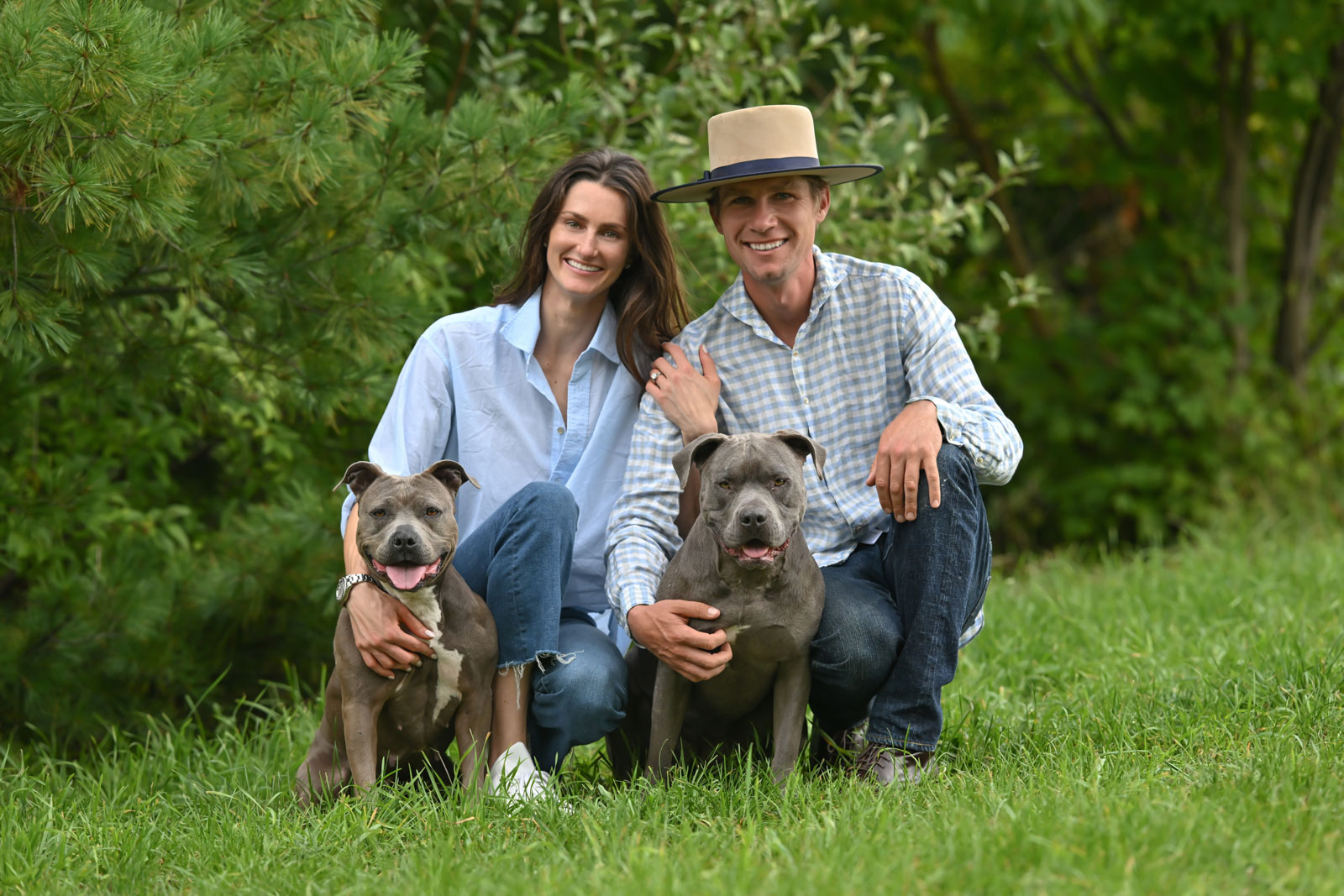Fueled by personal tragedy, she found a way to offer those suffering from mental illness new hope for finding a path back to wellness.
PHOTOS BY Alden Corrigan
Equestrian, model, mental health advocate, entrepreneur (and recently married to show jumper Karl Cook) —Mackenzie Cook is a Renaissance woman for the twenty-first century. Today, she is most well known as the founder of MiResource (miresource.com), a platform that helps people find and connect with the right mental health care for their unique needs. But long before mental health advocacy became an all-consuming passion, horses were an integral part of her DNA.

The daughter of an equestrian, Mackenzie first sat on a pony at the tender age of one. By the age of five, she began to ride in earnest. Throughout her childhood she rode competitively, with show jumping the discipline of choice. With her sights set firmly on riding and academics, Mackenzie’s path seemed certain. But as is so often the case, life can turn on a dime.

When she was 12 and inordinately tall for her age, Mackenzie was scouted by a modeling agency during a family trip to London. While she disregarded this first approach, a subsequent solicitation proved more difficult to ignore. Mackenzie knew of other girls who had modeled to pay for college and decided that the opportunity was too compelling to ignore.
Her instincts were on the money. Once bullied at school for her unusual height and slight frame, these features became her ticket to an international career as a model. Mackenzie’s first assignment came at age 15, when she walked for Valentino in Paris. Her career took off from there, and she modeled for some of the biggest names in fashion while completing high school online through a Stanford University program and still competing as a show jumper.

Mackenzie kept up this exhausting schedule for the next two years, losing more than one laptop to hairspray damage as she kept up with courses like AP calculus while working full time. While such a grueling work and show schedule would be enough to break the spirit of most young girls, Mackenzie continued showing horses, too. She explains, “I’d say these weren’t my best riding years since I was traveling so much. I’d fly in to compete, and I’d do pretty well, provided I could remember the course. With jet lag, that was pretty hit or miss the first day or so.”
This charmed life ended just before Mackenzie turned 18. She’d always planned to stop modeling when it was time for college, but her sister Shelby was experiencing a significant worsening of her depression, anxiety, and eating disorder. Mackenzie headed home six months earlier than planned to be with her sister, and it was then she discovered the challenges that face families with a loved one suffering from mental illness.
“We were really lucky, as we were a medical family on my father’s side. We lived in Woodside, California, right next to Stanford University. We had access to amazing care and great health insurance. My mom was a full-time mother, completely dedicated to finding care for Shelby, and my sister herself was very motivated to get better.” Despite their relatively privileged circumstances, the family struggled nonetheless, discovering just how difficult it is to navigate the mental health care system and find the right care.
Shelby started with one provider, only to develop suicidal ideation, which this provider was unequipped to treat. She was hospitalized for this and the eating disorder, but the residential facility didn’t take patients who self-harmed. Once it was discovered that Shelby was self-harming, another program had to be found. She bounced between providers, searching for but failing to find the right resources to address her illness. Despite Shelby’s personal, strong motivation to get better, a highly involved family with a much better than average understanding of the health care system, and the many resources available, her story had a heartbreaking ending. Shelby passed away, and Mackenzie was left wondering what the family could have done differently to save Shelby.
It was from this tragedy that Mackenzie’s passion was born. As is apparent from her family’s experience, there are significant challenges for anyone seeking mental health care. The obvious issues are financial and geographic. Patients with less-than-adequate or no insurance have an obvious problem, as do patients who live in areas with fewer mental health professionals and treatment facilities. However, a very significant and overlooked problem is getting referred to a professional equipped to treat a particular situation.
Imagine a patient with an ACL tear in the knee. Their doctor will refer them to an orthopedic surgeon to treat the injury. General practitioners can easily make referrals to other medical specialties. Check with the insurance company’s list of in-network orthopedists, make an appointment, and the problem is solved. When it comes to mental health professionals, it’s significantly more challenging to find the appropriate care. Mental health professionals are typically listed only as psychiatrists, clinical psychologists, psychopharmacologists, etc. There’s no listing by specialization—one psychologist may treat only eating disorders, for example, while another focuses on disorders such as schizophrenia. Finding the right doctor to treat a specific problem or a combination of problems can feel like looking for a needle in a haystack.
Mackenzie became obsessed with solving this problem and responded by first founding myteam.org, a non-profit with the mission of providing “Support for the Support” families struggling with mental health, and then MiResource, a for-profit company offering services free of charge to the public. The company sells software to health insurance and hospital systems that helps bridge the gap between the medical and mental health worlds, allowing seamless interaction to facilitate accurate and appropriate referrals.

Mackenzie teamed up with Dr. Gabriela Asturias in 2017 to found MiResource. “We set out to create a world where people could access effective mental health care,” she says. “Since the company’s inception, MiResource has helped more than 500,000 people connect to mental health care through its marketplace.” In the past year, the company has helped over 50,000 people connect to care, guided 717 with active suicidal ideation to emergency services, and helped 2,287 people with a history of suicidal ideation to mental health providers equipped to treat them. MiResource covers 45 states and includes options for all major insurance plans plus payment assistance options. The resource includes more than 9,000 mental health care providers, with 44 languages spoken.
In 2020, the National Institute of Mental Health awarded MiResource a $1.2 million grant to build the first machine learning algorithm designed to predict the appropriate level of care for a patient. She and her partner were the youngest ever recipients of such a grant. Mackenzie was named to Forbes’ “30 under 30 in Healthcare” list in 2022.

While helming MiResource through a new stage of development might seem to be an all-consuming venture, Mackenzie also has a full life outside of work. In April this year, she married renowned show jumper Karl Cook and only recently returned from supporting him at the Paris Olympics. Although she no longer rides competitively, she still makes time to ride with Karl almost every morning despite her packed work schedule. “Now that I’m riding with Karl again, he lets me show his old speed horse, Especial PS, in the one-meter 25s when we are at California horse shows,” Mackenzie says. “He’s my trainer, so I feel like the luckiest person on the planet. He’s seriously talented as an instructor, and he truly loves teaching.”
While the gravitational pull of the equestrian life will always be strong, mental health advocacy remains Mackenzie’s greatest passion. MiResource has had a powerful impact on thousands of patients and their families and will continue to do so in the future by offering ever more sophisticated options to connect patients with care. Fueled by personal tragedy, Mackenzie Cook has found a way to offer those suffering from mental illness new hope for finding a path back to wellness.
Read the print story here. To read the entire November/December 2025 issue here and to read more about EQ Living’s other featured equestrians click here.

